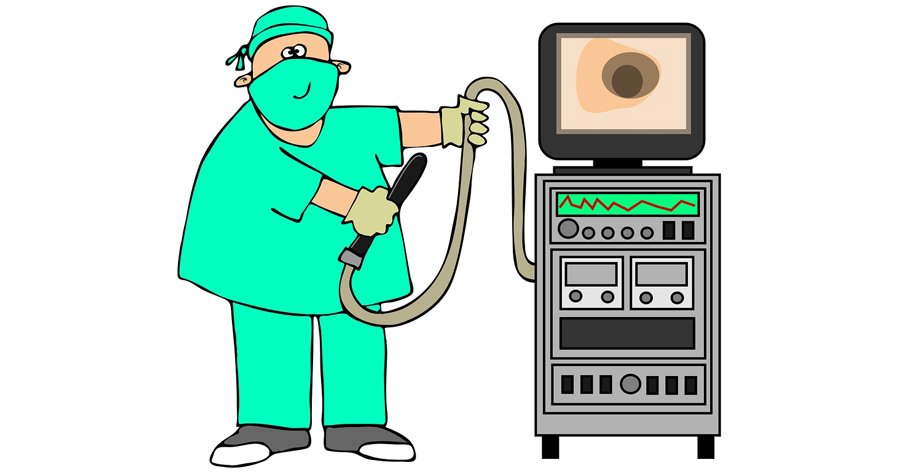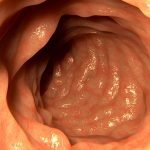Last week, we wrote about new guidelines that would allow patients to eat non-fibrous foods before undergoing a colonoscopy instead of doing the usual liquids-only fast. But for some people, even being allowed to enjoy a macaroni-and-cheese dinner followed by an ice-cream dessert isn’t enough to inspire them to pull down their pants for the colon cancer-screening procedure. As we mentioned in the previous post, over one-third of all those who doctors say should be screened for colon cancer forego the ordeal altogether. Other surveys have found a much larger percentage of people–almost two-thirds of those told by the doctor to get the test–holding out.1 Mills, David and Gebhart, Fred. “Dreading a Colonoscopy? Other Tests Are Just as Effective for Colon Cancer.” 20 March 2015. Healthline. 2 June 2016. http://www.healthline.com/health-news/dreading-colonoscopy-other-effective-tests-for-colon-cancer-032015#1
Ah, but there are alternative diagnostic tests available, although they aren’t widely advertised and many still don’t know about them. Doctors rarely recommend them, ostensibly because they fall a bit short of colonoscopies in terms of diagnostic accuracy. Plus, insurance companies don’t necessarily cover the alternative diagnostic methods. The logic is that if the less-intrusive test finds something suspicious, the patient will have to undergo a colonoscopy anyway, and the insurer will have to pay for both the first-line test and the colonoscopy. While colonoscopies find both existing cancers and polyps that might turn into cancer, the alternative tests only find cancers already in bloom.
In terms of finding existing cancers, at least one of the alternatives rivals colonoscopies, and it involves no imbibing of disgusting fluids that make you poop nonstop, and no surgery. Cologuard is a DNA-based stool test that you can administer at home. It’s the latest and most sensitive of a series of stool-based home tests, approved by the FDA in 2014. To take the Cologuard test, you simply collect a sample of your stool and send it to the lab. No fasting, no special diet, no sedative, no doctor’s probing fingers in your behind, no risk of colon perforation as there is with colonoscopies. Amazingly, the results are highly accurate, even a bit more accurate than colonoscopy results, at least in detecting full-blown cancers. According to the Cologuard website, “In a 10,000-patient clinical study, Cologuard found 92% of colon cancers.
While the medical establishment touts the fact that colonoscopies are 90 percent accurate in detecting existing cancers, at least one study of 68,000 people published in the Annals of Internal Medicine back in 2008 found a very different result.2 Colata, Gina. “Colonoscopies Miss Many Cancers, Study Finds.” 18 December 2008. The New York Times. 3 June 2016. http://www.nytimes.com/2008/12/16/health/16cancer.html The researchers were shocked to discover that colonoscopies missed virtually all cancers arising in the right side of the colon, and that’s where up to 40 percent of all cancers reside. They concluded that colonoscopies actually prevent only 60 to 70 percent of cancer deaths–not the 90 or even 100 percent commonly claimed. Somehow, that study seems to have gotten buried in the eight years since those results were published, and doctors are once again claiming that colonoscopies just about always find cancers if they exist. But as we’ve already discussed, that’s not necessarily so. In fact, a large-scale study is currently underway to determine once and for all the true accuracy rate of colonoscopies, but we won’t have the verdict for several more years–and then, of course, a number of years after that before the medical establishment actually begins to accept the results.
So where do we stand now?
As far as we know, given the existing data, Cologuard is at least equal to colonoscopies in detecting existing cancers, but colonoscopies excel compared to Cologuard in identifying pre-cancerous polyps. According to the Cologuard website, “[In clinical studies], Cologuard found 69% of high-risk precancers (high-grade dysplasia), those most likely to develop into cancer.” The fact that the test doesn’t catch about 30 percent of precancerous polyps is worrisome. The medical establishment thinks colonoscopies do better in that regard, plus, if a suspicious polyp is found during the course of a colonoscopy, the physician can simply remove it right then and there. On the other hand, Cologuard does detect pre-cancerous lesions originating on the right side of the colon, whereas colonoscopies don’t.
Another shortcoming of Cologuard that may make physicians hesitate to use it is its high rate of false positives triggered by foods like red meat and broccoli that have nothing to do with colon cancer. The Cologuard website notes, “In a clinical study of Cologuard, 13% of people without cancer or pre-cancer tested positive.” That’s a high margin of error, much higher than for other fecal-based colon cancer tests.
The medical establishment still holds colonoscopy as the gold standard in colon cancer detection, and those over 50 are supposed to get a colonoscopy once every 10 years. But experts point out that cancers can develop in that 10-year span, and that if individuals get annual fecal blood tests instead, they’ll be just as well covered.
So should you request Cologuard instead of scheduling a colonoscopy? That depends. The manufacturer recommends Cologuard for patients at average risk for colon cancer, in other words, not those with a family history of the disease or those who have had suspicious test results in the past. There’s also the fact that most insurance companies won’t pay for Cologuard (although Medicare will pay for it). On the other hand, if you’re paying out-of-pocket or have a high deductible, colonoscopies cost anywhere from $2000 to $19,000, depending on where the procedure is done and whether or not polyp removal is part of the deal.3 Pinder, Jeanne. “How Much is My Colonoscopy Going to Cost? $600? $5400?” 27 August 2014. The Health Care Compare that to the $600 bill for Cologuard.
The bottom line is that there are pros and cons to each screening method. Colonoscopies clean out polyps on the spot and can detect trouble brewing perhaps more accurately than a fecal exam, but they are invasive and miserable and there’s always the possibility that they’ll miss a right-side lesion. Cologuard might scare you half-to-death with a false positive and it might miss that tumor that’s about to cause trouble.
As Dr. Deborah Fisher of Duke University says, “There is no one test that is best for everybody. When it comes to colorectal cancer, the best test is the one you actually use.” In the end, though, perhaps the best way to think about it is no in terms of “either or” but in terms of “periodic colonoscopies supplemented by more regular fecal tests.”
References
| ↑1 | Mills, David and Gebhart, Fred. “Dreading a Colonoscopy? Other Tests Are Just as Effective for Colon Cancer.” 20 March 2015. Healthline. 2 June 2016. http://www.healthline.com/health-news/dreading-colonoscopy-other-effective-tests-for-colon-cancer-032015#1 |
|---|---|
| ↑2 | Colata, Gina. “Colonoscopies Miss Many Cancers, Study Finds.” 18 December 2008. The New York Times. 3 June 2016. http://www.nytimes.com/2008/12/16/health/16cancer.html |
| ↑3 | Pinder, Jeanne. “How Much is My Colonoscopy Going to Cost? $600? $5400?” 27 August 2014. The Health Care |












Would avoiding red meat and
Would avoiding red meat and broccoli, maybe 5 days, before taking a sample for Cologuard help with false positives? If so, is there a more inclusive list somewhere?